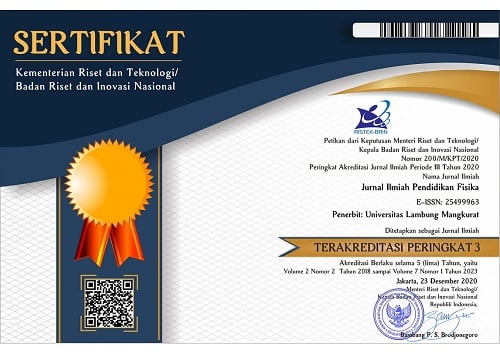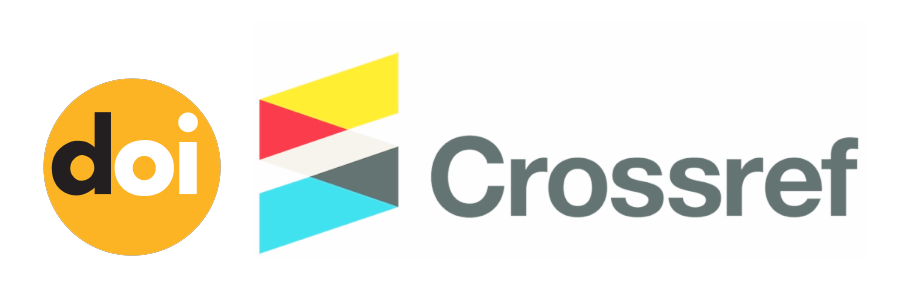The Effect of Digital Worksheets on Dynamic Fluids with Authentic Learning in Training Problem-Solving Skills
Abstract
Considering the importance of problem-solving skills in the 21st century, students should be trained in these skills, especially in sciences such as physics. Therefore, teaching materials such as worksheets are needed to train these skills. This study aims to describe the effect of digital worksheets on dynamic fluids with authentic learning in training students' problem-solving skills. The type of research used is pre-experimental with a one-group pretest-posttest design, with research subjects consisting of students in one of the XI MIPA classes in Barito Kuala Regency. The research data was collected through problem-solving skill tests before and after using the digital worksheets with the same material and then analyzed using normalized N-gain or gain scores. The results showed that the effect of the digital worksheets was in the high category with an N-gain score of 0.75, and students reached a good category in problem-solving skills. Therefore, it can be concluded that the digital worksheets on dynamic fluids with authentic learning effectively train students' problem-solving skills and can be used as input for teachers to train students' problem-solving skills.
Keywords
Full Text:
PDFReferences
Aini, N., Zainuddin, Z., & Mahardika, A. I. (2018). Pengembangan materi ajar ipa menggunakan model pembelajaran kooperatif berorientasi lingkungan lahan basah. Berkala Ilmiah Pendidikan Fisika, 6(2), 264. https://doi.org/10.20527/bipf.v6i2.4919
Akben, N. (2020). Effects of the problem-posing approach on students’ problem solving skills and metacognitive awareness in science education. Research in Science Education, 50(3), 1143–1165. https://doi.org/10.1007/s11165-018-9726-7
Araiza-Alba, P., Keane, T., Chen, W. S., & Kaufman, J. (2021). Immersive virtual reality as a tool to learn problem-solving skills. Computers and Education, 164. https://doi.org/10.1016/j.compedu.2020.104121
Arifuddin, M., Wati, M., Miriam, S., Suyidno, S., Misbah, M., Mahtari, S., Deni, M., & Ridho, M. H. (2019). Pengembangan desain lembar kerja siswa (lks) berbasis kreativitas ilmiah pada guru sains-fisika di kalimantan selatan. Bubungan Tinggi: Jurnal Pengabdian Masyarakat, 1(2), 92–99. https://doi.org/10.20527/btjpm.v1i2.1807
Aripin, W. A., Sahidu, H., & Makhrus, M. (2021). Efektivitas perangkat pembelajaran fisika berbasis model problem based learning untuk meningkatkan kemampuan pemecahan masalah dan kemampuan berpikir kritis peserta didik. Jurnal Penelitian Dan Pembelajaran Fisika Indonesia, 3(1), 19–23. https://doi.org/10.29303/jppfi.v3i1.120
Arsyad, Z., Santoso, U. T., & Wati, M. (2022). Profil keterampilan pemecahan masalah peserta didik smP. Jurnal Ilmiah Pendidikan Fisika, 6(3), 629. https://doi.org/10.20527/jipf.v6i3.6683
Astuti, N. H., Rusilowati, A., Subali, B., & Marwoto, P. (2020). Analisis kemampuan pemecahan masalah model polya materi getaran, gelombang, dan bunyi siswa smp. Unnes Physics Education Journal, 9(1), 3–6. http://journal.unnes.ac.id/sju/index.php/upej%0AAnalisis
Ayudha, C. F. H., & Setyarsih, W. (2021). Studi literatur: Analisis praktik pembelajaran fisika di sma untuk melatih keterampilan pemecahan masalah. Jurnal Pendidikan Fisika Undiksha, 11(1), 16. https://doi.org/10.23887/jjpf.v11i1.33427
Bakri, F., Permana, H., Wulandari, S., & Muliyati, D. (2020). Student worksheet with ar videos: Physics learning media in laboratory for senior high school students. Journal of Technology and Science Education, 10(2), 231–240. https://doi.org/10.3926/jotse.891
Budi, A. S., Sari, S. W., Sanjaya, L. A., Wibowo, F. C., Astra, I. M., Puspa, R. W., ... & Pertiwi, W. A. (2021). PhET-assisted electronic student worksheets of physics (eSWoP) on heat for inquiry learning during covid. Journal of Physics: Conference Series, 2104(1), 012030. IOP Publishing. https://doi.org/10.1088/17426596/2104/1/012030
Connolly, G. J. (2017). Applying social cognitive theory in coaching athletes: the power of positive role models. Strategies, 30(3), 23–29. https://doi.org/10.1080/08924562.2017.1297750
Fuadi, H., Melita, A. S., Siswadi, S., Jamaluddin, J., & Syukur, A. (2021). Inovasi worksheets dengan desains digital sebagai media pembelajaran ipa di smpn 7 mataram pada masa pandemi covid-19. Jurnal Ilmiah Profesi Pendidikan, 6(2), 167–174. https://doi.org/10.29303/jipp.v6i2.184
Gurjar, N. (2020). Leveraging social networks for authentic learning in distance learning teacher education. TechTrends, 64(4), 666–677. https://doi.org/10.1007/s11528-020-00510-7
Hake, R. R. (1998). Interactive-engagement versus traditional methods: a six-thousand-student survey of mechanics test data for introductory physics courses. American Journal of Physics, 66(1), 64–74. https://doi.org/10.1119/1.18809
Herrington, J., Reeves, T. C., & Oliver, R. (2010). A guide to authentic e-learning. https://doi.org/10.4324/9780203864265
Hewi, L., & Shaleh, M. (2020). Refleksi hasil pisa (the programme for international student assesment): upaya perbaikan bertumpu pada pendidikan anak usia dini). Jurnal Golden Age, 4(01), 30–41. https://doi.org/10.29408/jga.v4i01.2018
Hidayati, L. N., Nurhayati, S., Susatyo, E. B., & Wardani, S. (2022). Pengembangan lembar kerja peserta didik elektronik berbasis masalah untuk melatih keterampilan berpikir kritis peserta didik materi laju reaksi. Jurnal Inovasi Pendidikan Kimia, 16(2), 85–91. https://doi.org/10.15294/jipk.v16i2.30935
Hussein, B. (2020). Insights on using project-based learning to create an authentic learning experience of digitalization projects. In 2020 IEEE European Technology and Engineering Management Summit, E-TEMS 2020. https://doi.org/10.1109/E-TEMS46250.2020.9111829
Khairunnisa, & Ramlah. (2021). Aktivitas pemecahan masalah siswa dalam mengerjakan soal pisa ditinjau berdasarkan tahapan polya. Jurnal Pembelajaran Matematika Inovatif, 4(2), 445–452. https://doi.org/10.22460/jpmi.v4i2.445-452
Laksmi, M. L., Prayitno, B. A., & Indrowati, M. (2023). Effectiveness of collegiate learning assessment task-based ebook to empower critical explanatory with different problem-solving style types. Journal of Educators Online, 20(3).
https://doi.org/https://doi.org/10.9743/JEO.2023.20.3.3
Lase, N. K., & Zai, N. (2022). Pengembangan lembar kerja peserta didik (worksheets) berbasis contextual teaching and learning pada materi sistem ekskresi manusia di kelas viii smp negeri 3 idanogawo. Jurnal Pendidikan Minda, 3(2), 99–113.
Lestari, P. C., Miriam, S., & Misbah, M. (2021). Science literacy-based sound wave e-worksheet: Validity aspects. Journal of Physics: Conference Series, 2104(1), 012010. IOP Publishing.
https://doi.org/10.1088/1742-6596/2104/1/012010
Lin, K. Y., Yu, K. C., Hsiao, H. S., Chang, Y. S., & Chien, Y. H. (2018). Effects of web-based versus classroom-based stem learning environments on the development of collaborative problem-solving skills in junior high school students. International Journal of Technology and Design Education, 21–34. https://doi.org/10.1007/s10798-018-9488-6
Lowell, V. L., & Moore, R. L. (2020). Developing practical knowledge and skills of online instructional design students through authentic learning and real-world activities. TechTrends, 64(4), 581–590. https://doi.org/10.1007/s11528-020-00518-z
Ma’mun, S. (2019). Evaluasi efektivitas program pembinaan lanjut pada unit pelaksana teknis pelayanan sosial bina remaja pamekasan. Reformasi, 9(1), 31. https://doi.org/10.33366/rfr.v9i1.1255
Mahtari, S., Wati, M., Hartini, S., Misbah, M., & Dewantara, D. (2020). The effectiveness of the student worksheet with phet simulation used scaffolding question prompt. Journal of Physics: Conference Series, 1–5. https://doi.org/10.1088/1742-6596/1422/1/012010
Malik, A., Yuningtias, U. A., Mulhayatiah, D., Chusni, M. M., Sutarno, S., Ismail, A., & Hermita, N. (2019). Enhancing problem-solving skills of students through problem solving laboratory model related to dynamic fluid. Journal of Physics: Conference Series, 1–6. https://doi.org/10.1088/1742-6596/1157/3/032010
Ornellas, A., Falkner, K., & Edman Stålbrandt, E. (2018). Enhancing graduates’ employability skills through authentic learning approaches. Emeraldinsight, 9(1), 107–120. https://doi.org/10.1108/HESWBL-04-2018-0049
Patimah, S., Putri, D. H., & Syarkowi, A. (2022). Pengembangan instrumen tes keterampilan problem solving pada materi gerak lurus di sma. Jurnal Ilmiah Pendidikan Fisika, 6(3), 682. https://doi.org/10.20527/jipf.v6i3.6809
Ramadayanty, M., Sutarno, & Risdianto, E. (2021). Pengembangan e-modul fisika berbasis multiple reprsentation untuk melatihkan keterampilan pemecahan masalah siswa. Jurnal Kumparan Fisika, 4(1), 17–24. https://doi.org/https://doi.org/10.33369/jkf.4.1.17-24
Ramadhani, F. D., Wati, M., Misbah, & Wiyono, K. (2021). The validity of electronic learning materials optical instruments based on authentic learning to train students ’ problem solving skills. Kasuari: Physics Education Journal, 4(2), 78–89.
Saparini, S., Wiyono, K., & Muslim, A. B. (2020). Development of dinamic fluid learning video based on contextual in water area for high school students. Berkala Ilmiah Pendidikan Fisika, 8(2), 117. https://doi.org/10.20527/bipf.v8i2.8281
Saputri, S. R., Wati, M., & Misbah, M. (2021). Simple harmonic motion electronic teaching materials based on authentic learning to train students’ problem-solving skills: Aspects of validity. Journal of Physics: Conference Series, 2126(1), 1–8.
https://doi.org/10.1088/1742-6596/2126/1/012016
Sari, E. N., & Susilowibowo, J. (2022). Pengembangan e-worksheets berbasis hots pada mata pelajaran praktikum akuntansi lembaga kelas xi semester 2. Edukatif : Jurnal Ilmu Pendidikan, 4(3), 4469–4483. https://doi.org/10.31004/edukatif.v4i3.2709
Singer, A. (2020). How to foster the formation of STEM identity: studying diversity in an authentic learning environment. International Journal of STEM Education, 7(1). https://doi.org/10.1186/s40594-020-00254-z
Sugiyono. (2019). Metode penelitian pendidikan (kuantitatif, kualitatif, kombinasi, R&D dan penelitian pendidikan). Alfabeta Alfabeta.
Sulistiani, D. (2018). Penerapan metode outentic learning dapat meningkatkan pembelajaran ilmu pengetahuan alam. Jurnal Penelitian Guru FKIP Universitas Subang, 1(2), 23–32.
Supriyadi, Wati, M., Miriam, S., & Sasmita, F. D. (2022). Efektivitas modul bermuatan authentic learning pada materi gerak lurus untuk melatihkan keterampilan pemecahan masalah. Edufisika: Jurnal Pendidikan Fisika, 7(1), 62–71.
Veerasamy, A. K., D’Souza, D., Lindén, R., & Laakso, M. (2018). Relationship between perceived problem-solving skills and academic performance of novice learners in introductory programming courses. Journal of Computer Assisted Learning, 1–10.
https://doi.org/10.1111/jcal.12326
Wijayanti, A., & Ernawati, T. (2020). Development of digital worksheet based on ngerti, ngrasa, nglakoni to improve college student lifeskill. Unnes Science Education Journal, 9(1), 1–6. https://doi.org/10.15294/usej.v9i1.35780
Winkler, R., Sollner, M., & Leimeister, J. M. (2021). Enhancing problem-solving skills with smart personal assistant technology. Computers and Education, 165. https://doi.org/10.1016/j.compedu.2021.104148
Wulantri, Distrik, I. W., Suyatna, A., & U Rosidin. (2019). The effectiveness of creative-inquiry-based student worksheet in improving physics self-efficacy and problem solving of senior high school students. Journal of Physics: Conference Series, 1–6. https://doi.org/10.1088/1742-6596/1467/1/012036
Yanti, H., Distrik, I. W., & Rosidin, U. (2019). The effectiveness of students’ worksheets based on multi- representation in improving students’ metacognition skills in static electricity. Journal of Physics: Conference Series, 1–9. https://doi.org/10.1088/1742-6596/1155/1/012083
Yuberti, Y., Latifah, S., Anugrah, A., Saregar, A., Misbah, M., & Jermsittiparsert, K. (2019). Approaching problem-solving skills of momentum and impulse phenomena using context and problem-based learning. European Journal of Educational Research, 8(4), 1217-1227.https://doi.org/10.12973/eu-jer.8.4.1217
DOI: https://doi.org/10.20527/jipf.v8i2.9245
Refbacks
- There are currently no refbacks.
Indexed by: Jurnal Ilmiah Pendidikan Fisika is licensed under a creative commons attribution-share alike 4.0 international license
Statistics Counter |
















